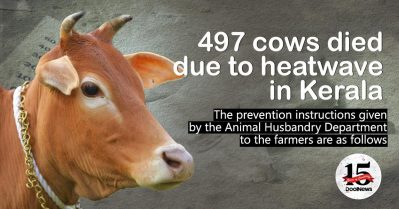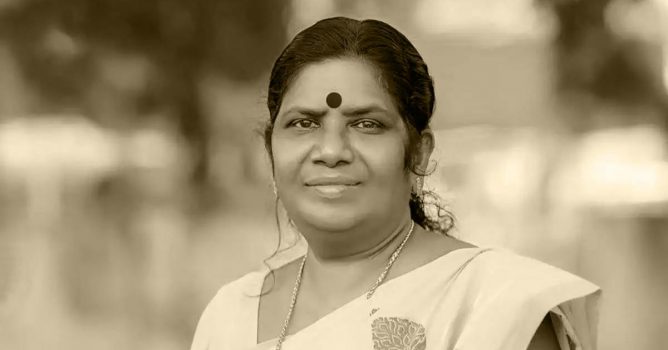
Thiruvananthapuram: Heatwave conditions have led to the demise of 497 cows in Kerala from mid-February to the end of April, as reported by the office of Animal Husbandry Minister J. Chinchurani. Kollam district ranks highest with 105 cow fatalities, followed by Palakkad, where 67 cows succumbed to heat stress.
The Animal Husbandry department of Kerala notes that the scarcity of water and green fodder has severely impacted the animal husbandry sector. Forty-four panchayats are grappling with water shortages, according to a statement from Ms. Chinchurani’s office.

J. Chinchurani
District administrations are compiling data on the losses suffered by the Animal Husbandry Department. Adverse conditions, marked by the absence of greenery and water scarcity, are exacerbating the situation. The dairy sector has witnessed a shortfall of 6.5 lakh liters of milk production, representing an increase from the two lakh liters lost during the previous summer.
As a preventive measure against heatstroke, the Animal Husbandry department advises farmers against letting cattle graze in open spaces and fields between 11 a.m. and 3 p.m. Animal transportation should be rescheduled to the cooler morning and evening hours. Recommendations include relocating animals from sheds with asbestos and metal roofing to shaded areas, ensuring constant ventilation using fans, and utilizing materials like tarps and polycarbonate sheets for shading.
Special care should be taken to keep animals in cool spaces and ensure an adequate water supply to prevent dehydration.
An emergency meeting chaired by Minister for Animal Husbandry and Dairying J. Chinchurani directed department officials to conduct field visits and submit reports on domestic animal deaths due to heat stress within two days. This is the first time Kerala has witnessed such a high number of cow deaths due to heat stress. The minister emphasized the seriousness of the situation and instructed staff to raise awareness among farmers about proper cow care. The minister also assured that compensation from the Disaster Management Fund for farmers who lost their cows will be provided in June and instructed all district officers to submit daily reports on cow deaths to the directorate.
”The officers have been told to meet with farmers to offer advice on how to protect their cows. It is important to ensure that the milch cows have access to fresh grass and water. Farmers are advised not to leave the cows out in open fields for grazing. They can help reduce heat by installing sprinklers or spreading wet sacks on the roof of cow sheds to provide extra water and shade. Water sprinkling can also help reduce heat stress on the cows. Funds have been allocated to panchayats for distributing water, ensuring that a shortage of funds will not hinder efforts to protect the cows.” Ms. Chinchurani said.
“Leaving the cows in open fields during hot hours for grazing is one reason for heat stress deaths. A cow which gives around 10 litres of milk needs around 100 litres of water a day and if the quantity of water is not sufficient it can add to the stress. The reflected heat in the cow sheds without proper air circulation is also a reason,” said a veterinary officer.
The department can provide Rs 16,400 as compensation for cow deaths. The minister has instructed officials to expedite procedures to release funds from the finance department. The state government can provide Rs 37,500 as compensation from the disaster management fund.
content highlights: 497 cows died due to heatwave in Kerala